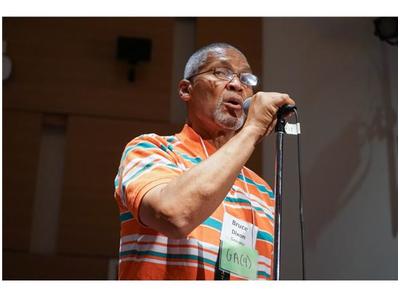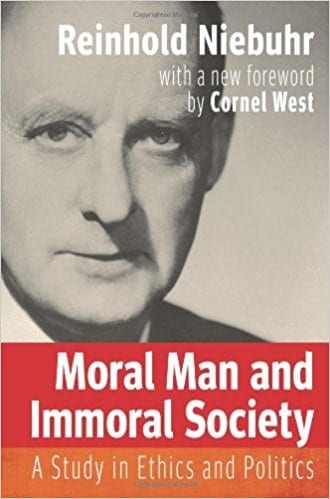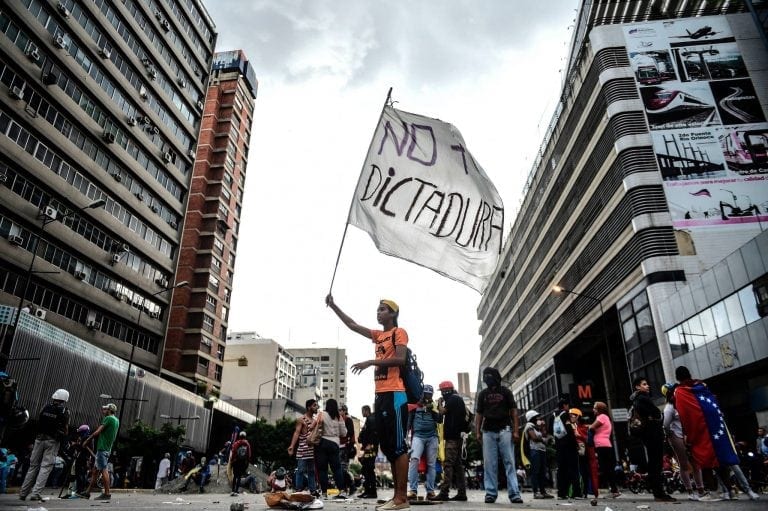The Europe That Can Say No?
by GARY LEUPP

Federica Mogherini: a rare voice of reason and even hope in a continent now accustomed to vassalage.
EU president and Polish politician Donald Tusk says the U.S. acts with “capricious assertiveness.” With friends like this who needs enemies?” he asked the other day, adding, “If you need a helping hand you will find one at the end of your arm.”
EU vice-president Federica Mogherini met with European and Iranian representatives after the U.S. decision to leave the Iran nuclear agreement. She committed Europe to the following:
The protection of European Union economic operators and ensuring legal certainty:
And last but not least, the further development of a transparent, rules-based business environment in Iran.”
Meanwhile U.S. National Security Advisor John Bolton asks rhetorically on ABC: “Why would any business, why would the shareholders of any business, want to do business with the world’s central banker of international terrorism?” He threatens secondary sanctions on nations that, adhering to the agreement, expand trade with Iran.
Some including RT commentators predict Europe will buckle to U.S. pressure and cancel contracts. But maybe not this time. Maybe Europe will become the Europe That Can Say No.
“We are working on finding a practical solution … in a short delay of time,” Mogherini says. “We are talking about solutions to keep the deal alive. We have a quite clear list of issues to address. We are operating in a very difficult context … I cannot talk about legal or economic guarantees but I can talk about serious, determined, immediate work from the European side.”
Immediate work to diminish the damage done to world peace and stability by Trump’s withdrawal from the Iran nuclear agreement.
According to EU Commissioner Dimitris Avramopoulus, the EU is preparing legislation to block U.S. sanctions targeting Iran. Its members know that if Iran reaps no sanctions relief from the agreement it will also withdraw, charging betrayal. France’s Total S.A. and Germany’s Siemens have indicated they may back out of contracts with Iran due to fears of U.S. secondary sanctions. The U.S. strives to use access to its marketplace to shape others’ investment options, in this case options that can lead to war. No matter that this violates the sacred bourgeois principle of Free Trade.
There are all kinds of good reasons for Iran and the rest of the world to expand trade ties. (French cooks would like access to Iranian pistachios—the world’s best—and saffron.) And there’s no reason for other governments to embrace Bolton’s view that the Iranian government is the central banker of international terrorism. (Surely that is Saudi Arabia, the world’s leading supporter of Salafist Sunni Islamism, which supports the Syrian Liberation Front, the Army of Conquest, and Ahrar al-Sham. The Saudi monarchy, presiding over a society far more oppressive than Iranian or Syrian society—but spared media outrage—pursues its unholy alliance with Israel to bring down the regime in Tehran, preparing for the coming confrontation by invading Bahrain, isolating Qatar, pulverizing Yemen and bombing Syria at U.S. behest and kidnapped the Lebanese prime minister in order to influence Lebanese politics and diminish the role of Hizbollah.)
And there are all kinds of reasons for Europe to stand up to the U.S. and say, “Your sanctions are not our sanctions.” And maybe add: Your intentions for further regime change in the Middle East are not popular in Europe, which fears more waves of refugees. And also add: The sanctions you’ve demanded we impose on Russia following the February 2014 coup in Ukraine and consequent Russian reassertion of sovereignty over the Crimean Peninsula are hurting Europe and should be lifted.
There should be a multilateral world. It already exists, actually, but the U.S. ruling class, wedded as it is to “full-spectrum dominance” and notions of U.S. “exceptionalism” resists acknowledging it. Bolton’s remarks are telling.

A suckup-kickdown bully, and dual nationality Neocon (Israel/US), JohnBolton is surely one of the most odious figures in modern history.
“I think the Europeans will see that’s in their interest ultimately to go along with this,” he told CNN’s Jake Tapper over the weekend. Asked if the U.S. would apply sanctions to European firms, he said vaguely, “It’s possible. It depends on the conduct of other governments.” He notes legal devices available to the U.S. such as the denial of licenses. He threatens to pull out all the stops to impede the world’s effort to conciliate Iran. He wants to coordinate Saudi, Israeli, U.S. and MEK efforts to effect regime change in Tehran; as he told an MEK audience in July 2017, he expects this by 2019!
This is the U.S. National Security Advisor, serving an unusually unbalanced, ignorant U.S. president. (The British demanded his withdrawal from the Libya talks in 2004 because he was overbearing, indeed acting like a madman.) He is saying, confidently, Europe will go along “when they see it’s in their interest.” Maybe he and Trump miscalculate. The EU even without Britain rivals the U.S. in population and GDP. If it once needed to obey, it might not need to (or want to) now. The U.S. these days does not smell of freedom, democracy, liberal values, calm reason, tolerated dissent. It reeks of white nationalism, racist exclusion, institutional police violence and murder, and seemingly irrevocable tendency towards the concentration of wealth in the .01%. It is a fundamentally unfair, unjust, unadmirable society that tortures its youth by offering them low-paying jobs and endless student debt if they were lucky enough to go to college. It denies its people the normal standard of public health care and charges them twice the Canadian fees.
It is a basically a fucked-up country. After its (ongoing) disasters in Yugoslavia, Afghanistan, Iraq, Syria, Libya, Yemen, Somalia, Lebanon and elsewhere, it has no moral leg to stand on in lecturing Europe to maintain sanctions on Iran. After siding 100% with Israel, on everything imaginable, it has lost any credibility as an honest broker in international relations. [Never had much, if any, credibility with any intelligent person.—Ed]
The EU comprises various imperialist countries who of course exploit workers throughout the world, competing in the process with the U.S. They are not morally different from the U.S. But their governments increasingly chafe under U.S. hegemony, and this particular nut-case hegemon, Donald Trump.
Angela Merkel said last week that Europe can no longer count on the United States to protect it. “It is no longer such that the United States simply protects us,” she declared, “but Europe must take its destiny in its own hands. That’s the task of the future,” she said during a speech honoring French President Emmanuel Macron, who said European nations should not allow “other major powers, including allies” to “put themselves in a situation to decide our diplomacy [and] security for us.” Trump was all over this guy in his last visit but the bromance ends here. You do not order proud France to cease trade ties with Iran just because you’re looking for another war. Europeans are tired of that. Tired of being taken for granted as slavish allies when the U.S. decides to attack somebody. The Truman Doctrine is dead, the Cold War over, Europe despite Brexit increasingly united in its ability to collectively respond to U.S. pressure.
Let there be an intensification of inter-imperialist contradictions! Let Germany say, yes, brothers and sisters, let us make Mercedez-Benz in Tehran! Let us sell you Airbus passenger airliners! Let us buy your walnuts and pomegranates and carpets. And let us tell the Americans the “American century” is not gonna happen.
 Male Colors: The Construction of Homosexuality in Tokugawa Japan; and Interracial Intimacy in Japan: Western Men and Japanese Women, 1543-1900. He is a contributor to Hopeless: Barack Obama and the Politics of Illusion, (AK Press). He can be reached at: gleupp@tufts.edu
Male Colors: The Construction of Homosexuality in Tokugawa Japan; and Interracial Intimacy in Japan: Western Men and Japanese Women, 1543-1900. He is a contributor to Hopeless: Barack Obama and the Politics of Illusion, (AK Press). He can be reached at: gleupp@tufts.edu 
This work is licensed under a Creative Commons Attribution-NonCommercial 4.0 International License
Parting shot—a word from the editors
The Best Definition of Donald Trump We Have Found
 In his zeal to prove to his antagonists in the War Party that he is as bloodthirsty as their champion, Hillary Clinton, and more manly than Barack Obama, Trump seems to have gone “play-crazy” — acting like an unpredictable maniac in order to terrorize the Russians into forcing some kind of dramatic concessions from their Syrian allies, or risk Armageddon.However, the “play-crazy” gambit can only work when the leader is, in real life, a disciplined and intelligent actor, who knows precisely what actual boundaries must not be crossed. That ain’t Donald Trump — a pitifully shallow and ill-disciplined man, emotionally handicapped by obscene privilege and cognitively crippled by white American chauvinism. By pushing Trump into a corner and demanding that he display his most bellicose self, or be ceaselessly mocked as a “puppet” and minion of Russia, a lesser power, the War Party and its media and clandestine services have created a perfect storm of mayhem that may consume us all.— Glen Ford, Editor in Chief, Black Agenda Report
In his zeal to prove to his antagonists in the War Party that he is as bloodthirsty as their champion, Hillary Clinton, and more manly than Barack Obama, Trump seems to have gone “play-crazy” — acting like an unpredictable maniac in order to terrorize the Russians into forcing some kind of dramatic concessions from their Syrian allies, or risk Armageddon.However, the “play-crazy” gambit can only work when the leader is, in real life, a disciplined and intelligent actor, who knows precisely what actual boundaries must not be crossed. That ain’t Donald Trump — a pitifully shallow and ill-disciplined man, emotionally handicapped by obscene privilege and cognitively crippled by white American chauvinism. By pushing Trump into a corner and demanding that he display his most bellicose self, or be ceaselessly mocked as a “puppet” and minion of Russia, a lesser power, the War Party and its media and clandestine services have created a perfect storm of mayhem that may consume us all.— Glen Ford, Editor in Chief, Black Agenda Report

















